JIM.LOBE
- United States foreign policy Hijacked (FCN, 07-02-2004)
- Webcast: Guidance in a Time of Trouble (FCN, 05-03-2004)

WASHINGTON (IPS/GIN) – The Washington foreign policy elite finds itself on pins and needles awaiting a response from the neoconservative heavyweights at the Weekly Standard magazine to a scorching denunciation by one of their most venerable fellow travelers, Francis Fukuyama, in Sunday’s New York Times magazine.
Mr. Fukuyama, best known for his post-Cold War essay proclaiming the historic inevitability of liberal democracy, “The End of History,” argued in the Times article that neoconservatives so badly miscalculated the myriad costs of the Iraq war that they may have empowered their two foreign policy nemeses–realists, who disdain democracy promotion; and isolationists, who oppose foreign entanglements of almost any kind.
Even more provocatively, he called the Standard‘s editor, William Kristol, his ideological sidekick, Robert Kagan, and their neo-conservative comrades who led the drive to war in Iraq “Leninist” in their conviction that liberal democracy can be achieved through “coercive regime change” or imposed by military means.
“(T)he neoconservative position articulated by people like Kristol and Kagan was … Leninist; they believed that history can be pushed along with the right application of power and will,” according to Mr. Fukuyama. “Leninism was a tragedy in its Bolshevik version, and it has returned as farce when practiced by the United States.
“Neoconservativism, as both a political symbol and a body of thought,” he went on, “has evolved into something I can no longer support.”
Mr. Fukuyama’s break with the neo-conservatives marks the latest, albeit among the most spectacular, fracture in the ongoing splintering of the Republican foreign policy elite that has included aggressive nationalists, such as Vice President Dick Cheney; the Christian Right; traditional realists in the mold of former President George H.W. Bush; as well as neoconservatives.
His divorce from the movement is particularly remarkable given his long and close friendship, dating back to his college days, with former deputy defense secretary (and now World Bank President) Paul Wolfowitz, perhaps the neoconservative movement’s most idealistic luminary. He also played a role in the development of the unilateralist Project for the New American Century (PNAC), founded in 1997 by Messrs. Kristol and Kagan to forge an alliance between the neoconservatives, the Christian Right, and aggressive nationalists in the run-up to the 2000 elections.
Along with Vice President Cheney, Mr. Wolfowitz and Pentagon chief Donald Rumsfeld, Mr. Fukuyama was one of just two dozen PNAC charter members. He also signed a 1998 PNAC letter to then-president Bill Clinton urging him to “undertake military action” aimed at “removing Saddam Hussein and his regime from power.”
Indeed, as late as Sept. 20, 2001, nine days after 9/11, he signed another PNAC letter to Pres. Bush that also called for Saddam Hussein’s ouster “even if evidence does not link Iraq directly to the attack.” Anything less, the letter argued, “will constitute an early and perhaps decisive surrender in the war on international terrorism.”
Despite those hawkish antecedents, Mr. Fukuyama had second thoughts even before the Iraq invasion, particularly about the democratic messianism and unilateralism with which the “war on terror” was being conducted.
In a December 2002 Wall Street Journal article, he warned that “the idealist project” of transforming the region may “come to look more like empire pure and simple” and that “it is not at all clear that the American public understand that it is getting into an imperial project as opposed to a brief in-and-out intervention in Iraq.”
But by late 2004, he was writing that anyone, particularly neoconservatives, who believed the situation in Iraq would become sufficiently stable after elections in early 2005 for U.S. troops to begin withdrawing was “living in fantasyland.”
And one year later, he was already warning that failures in Iraq were paving the way for a return to U.S. isolationism. He believed that the Abu Ghraib prison scandal, coupled with Washington’s failure to marshal international support for its efforts in Iraq and its incompetence in stabilizing the country, had largely destroyed its credibility as a “benevolent hegemon” to which the world would willingly, if not eagerly, defer.
Mr. Fukuyama’s latest article, “After Neoconservatism,” is essentially an elaboration of these ideas in a more comprehensive form, as well as a plea for a more modest and classically “conservative” foreign policy that, without abandoning “the neoconservative belief in the universality of human rights,” will also be conducted “without its illusions about the efficacy of American power and hegemony to bring these ends about.”
“The war’s supporters seemed to think that democracy was a kind of default condition to which societies reverted once the heavy lifting of coercive regime change occurred, rather than a long-term process of institution-building and reform,” according to Mr. Fukuyama.
He noted that that expectation helps explain “the Bush administration’s incomprehensible failure to plan adequately for the insurgency that subsequently emerged in Iraq.”
The administration and its neoconservative backers also assumed, mistakenly, that the rest of the world would accept Washington’s unilateralism, including pre-emptive war, because, as a “benevolent hegemon,” or leader, Washington would be seen as both more virtuous and more competent than other countries.
These delusions have come at a very high cost, according to Mr. Fukuyama, who, notwithstanding the sweeping pro-democracy rhetoric in which both Pres. Bush and Secretary of State Condoleezza Rice continue to indulge, “the neoconservative moment appears to have passed.”
“Neoconservativism, whatever its complex roots, has become indelibly associated with concepts like coercive regime change, unilateralism and American hegemony,” according to Mr. Fukuyama. “What is needed now are new ideas, neither neoconservative nor realist, for how America is to relate to the rest of the world.”












